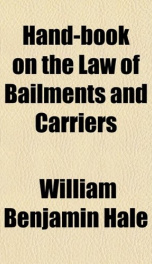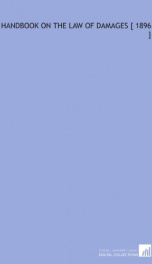hand book on the law of bailments and carriers

Purchase of this book includes free trial access to www.million-books.com where you can read more than a million books for free. This is an OCR edition with typos. Excerpt from book: its.11 An ordinary deposit of money in a bank on account must not be confused with this class of bailments. Such a deposit creates the relation of debtor and creditor, and not that of bailor and bailee.12 It is not a bailment, for the identical money need not be returned. But where property such as gold, bonds, stocks, or other things of value, or even money, is deposited with a bank on the understanding that the identical thing deposited is to be returned, it is called a "special deposit," and constitutes a bailment.1' Mandatum. The second division of bailments for the sole benefit of the bailor was known to the civil law under the title of "mandatum," which word was anglicized by Sir William Jones in his "Essay" on Bailments, and which has been subsequently used by almost all writers on the subject, as a "mandate." 14 Various definitions have been v. Cook, 9 Johns. (N. Y.) 301, a constable, having taken goods on an execution against ?., delivered them to C., who gave a receipt for them, promising to deliver them to the constable on demand. The constable suffered the execution to expire without making any demand for the goods. In an action brought by the constable against C., it was held that he was a mere naked bailee, and that no action would lie against him until after a demand and refusal of the goods. If a chattel be taken from one who receipts and promises in writing to redeliver it, by another who has a paramount title, the bailee is discharged. Edson v. Weston, 7 Cow. (N. Y.) 278. The liability of a receiptor to a sheriff is as broad as his covenant, and is dischargeable only by act of God or the public enemy. Cornell v. Dakln, 38 N. Y. 253. 11 See post, p. 47. ? Commercial Bank v. Hughes, 17 Wend. (N. Y.) 94; Carroll v. Cone, 40 Harb. (N. Y.) 220; Phoenix ...
Info about the book
Author:
Series:
Unknown
ISBN:
5876189545
Rating:
3/5 (3)Your rating:
0/5
Languge:
English
Users who have this book
Users who want this book
What readers are saying
What do you think? Write your own comment on this book!
write a commentGenre
if you like hand book on the law of bailments and carriers try:
Other books by this author
Do you want to exchange books? It’s EASY!
Get registered and find other users who want to give their favourite books to good hands!



